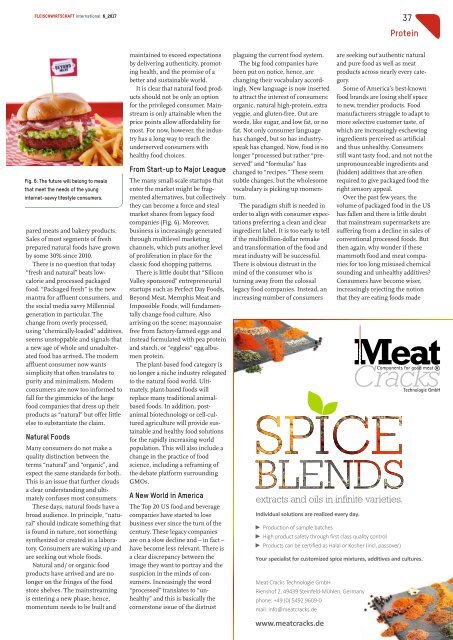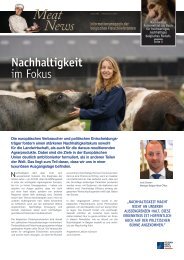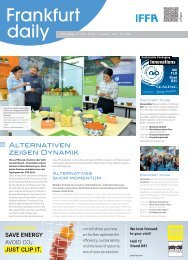FLEISCHWIRTSCHAFT international 6/2017
Create successful ePaper yourself
Turn your PDF publications into a flip-book with our unique Google optimized e-Paper software.
Fleischwirtschaft <strong>international</strong> 6_<strong>2017</strong><br />
37<br />
Protein<br />
Fig. 6: The future will belong to meals<br />
that meet the needs of the young<br />
internet-savvy lifestyle consumers.<br />
pared meats and bakery products.<br />
Sales of most segments of fresh<br />
prepared natural foods have grown<br />
by some 30% since 2010.<br />
There is no question that today<br />
“fresh and natural”beats lowcalorie<br />
and processed packaged<br />
food. “Packaged fresh” is the new<br />
mantra for affluent consumers, and<br />
the social media savvy Millennial<br />
generation in particular.The<br />
change from overly processed,<br />
using “chemically-loaded”additives,<br />
seems unstoppable and signals that<br />
anew age of whole and unadulterated<br />
food has arrived. The modern<br />
affluent consumer now wants<br />
simplicity that often translates to<br />
purity and minimalism. Modern<br />
consumers are now too informed to<br />
fall for the gimmicks of the large<br />
food companies that dress up their<br />
products as “natural”but offer little<br />
else to substantiate the claim.<br />
Natural Foods<br />
Many consumers do not make a<br />
quality distinction between the<br />
terms “natural”and “organic”, and<br />
expect the same standards for both.<br />
This is an issue that further clouds<br />
aclear understanding and ultimately<br />
confuses most consumers.<br />
These days, natural foods have a<br />
broad audience. In principle, “natural”should<br />
indicate something that<br />
is found in nature, not something<br />
synthesized or created in alaboratory.Consumers<br />
are waking up and<br />
are seeking out whole foods.<br />
Natural and/ or organic food<br />
products have arrived and are no<br />
longer on the fringes of the food<br />
store shelves. The mainstreaming<br />
is entering anew phase, hence,<br />
momentum needs to be built and<br />
maintained to exceed expectations<br />
by delivering authenticity,promoting<br />
health, and the promise of a<br />
better and sustainable world.<br />
It is clear that natural food products<br />
should not be only an option<br />
for the privileged consumer.Mainstream<br />
is only attainable when the<br />
price points allow affordability for<br />
most. Fornow,however,the industry<br />
has along way to reach the<br />
underserved consumers with<br />
healthy food choices.<br />
From Start-up to Major League<br />
The many small-scale startups that<br />
enter the market might be fragmented<br />
alternatives, but collectively<br />
they can become aforce and steal<br />
market shares from legacy food<br />
companies (Fig. 6). Moreover,<br />
business is increasingly generated<br />
through multilevel marketing<br />
channels, which puts another level<br />
of proliferation in place for the<br />
classic food shopping patterns.<br />
There is little doubt that “Silicon<br />
Valley sponsored”entrepreneurial<br />
startups such as Perfect Day Foods,<br />
Beyond Meat, Memphis Meat and<br />
Impossible Foods, will fundamentally<br />
change food culture. Also<br />
arriving on the scene: mayonnaise<br />
free from factory-farmed eggs and<br />
instead formulated with pea protein<br />
and starch, or "eggless" egg albumen<br />
protein.<br />
The plant-based food category is<br />
no longer aniche industry relegated<br />
to the natural food world. Ultimately,plant-based<br />
foods will<br />
replace many traditional animalbased<br />
foods. In addition, postanimal<br />
biotechnology or cell-cultured<br />
agriculture will provide sustainable<br />
and healthy food solutions<br />
for the rapidly increasing world<br />
population. This will also include a<br />
change in the practice of food<br />
science, including areframing of<br />
the debate platform surrounding<br />
GMOs.<br />
ANew World in America<br />
The Top20USfood and beverage<br />
companies have started to lose<br />
business ever since the turn of the<br />
century.These legacy companies<br />
are on aslow decline and –infact –<br />
have become less relevant. There is<br />
aclear discrepancy between the<br />
image they want to portray and the<br />
suspicion in the minds of consumers.<br />
Increasingly the word<br />
“processed”translates to “unhealthy”and<br />
this is basically the<br />
cornerstone issue of the distrust<br />
plaguing the current food system.<br />
The big food companies have<br />
been put on notice, hence, are<br />
changing their vocabulary accordingly.New<br />
language is now inserted<br />
to attract the interest of consumers:<br />
organic, natural high-protein, extra<br />
veggie, and gluten-free. Out are<br />
words, like sugar,and low fat, or no<br />
fat. Notonly consumer language<br />
has changed, but so has industryspeak<br />
has changed. Now, food is no<br />
longer “processed but rather “preserved”and<br />
“formulas” has<br />
changed to “recipes.” These seem<br />
subtle changes, but the wholesome<br />
vocabulary is picking up momentum.<br />
The paradigm shiftisneeded in<br />
order to align with consumer expectations<br />
preferring aclean and clear<br />
ingredient label. It is too early to tell<br />
if the multibillion-dollar remake<br />
and transformation of the food and<br />
meat industry will be successful.<br />
There is obvious distrust in the<br />
mind of the consumer who is<br />
turning away from the colossal<br />
legacy food companies. Instead, an<br />
increasing number of consumers<br />
are seeking out authentic natural<br />
and pure food as well as meat<br />
products across nearly every category.<br />
Some of America’s best-known<br />
food brands are losing shelf space<br />
to new,trendier products. Food<br />
manufacturers struggle to adapt to<br />
more selective customer taste, of<br />
which are increasingly eschewing<br />
ingredients perceived as artificial<br />
and thus unhealthy.Consumers<br />
still want tasty food, and not not the<br />
unpronounceable ingredients and<br />
(hidden) additives that are often<br />
required to give packaged food the<br />
right sensory appeal.<br />
Over the past few years, the<br />
volume of packaged food in the US<br />
has fallen and there is little doubt<br />
that mainstream supermarkets are<br />
suffering from adecline in sales of<br />
conventional processed foods. But<br />
then again, why wonder if these<br />
mammoth food and meat companies<br />
for too long misused chemical<br />
sounding and unhealthy additives?<br />
Consumers have become wiser,<br />
increasingly rejecting the notion<br />
that they are eating foods made

















